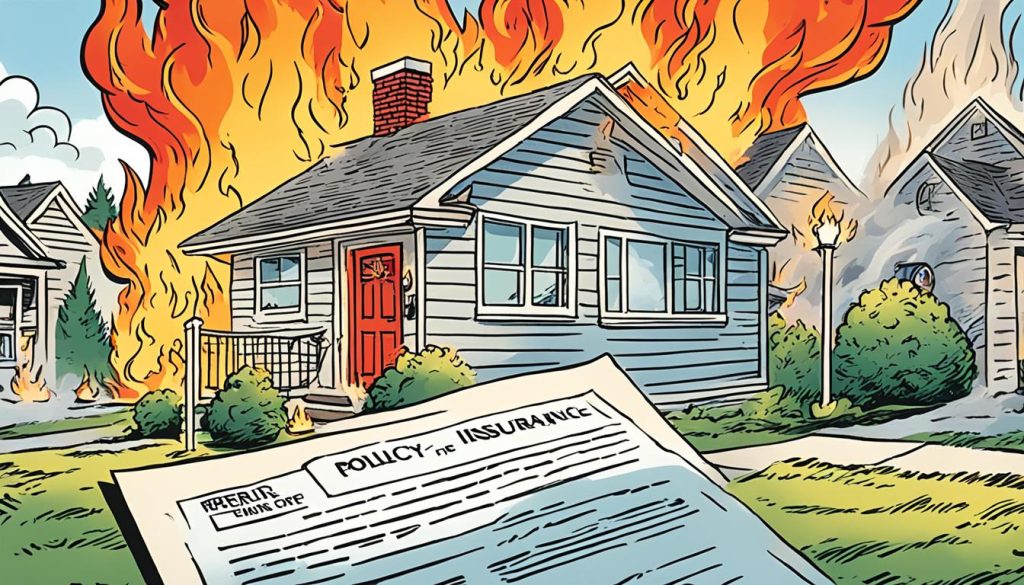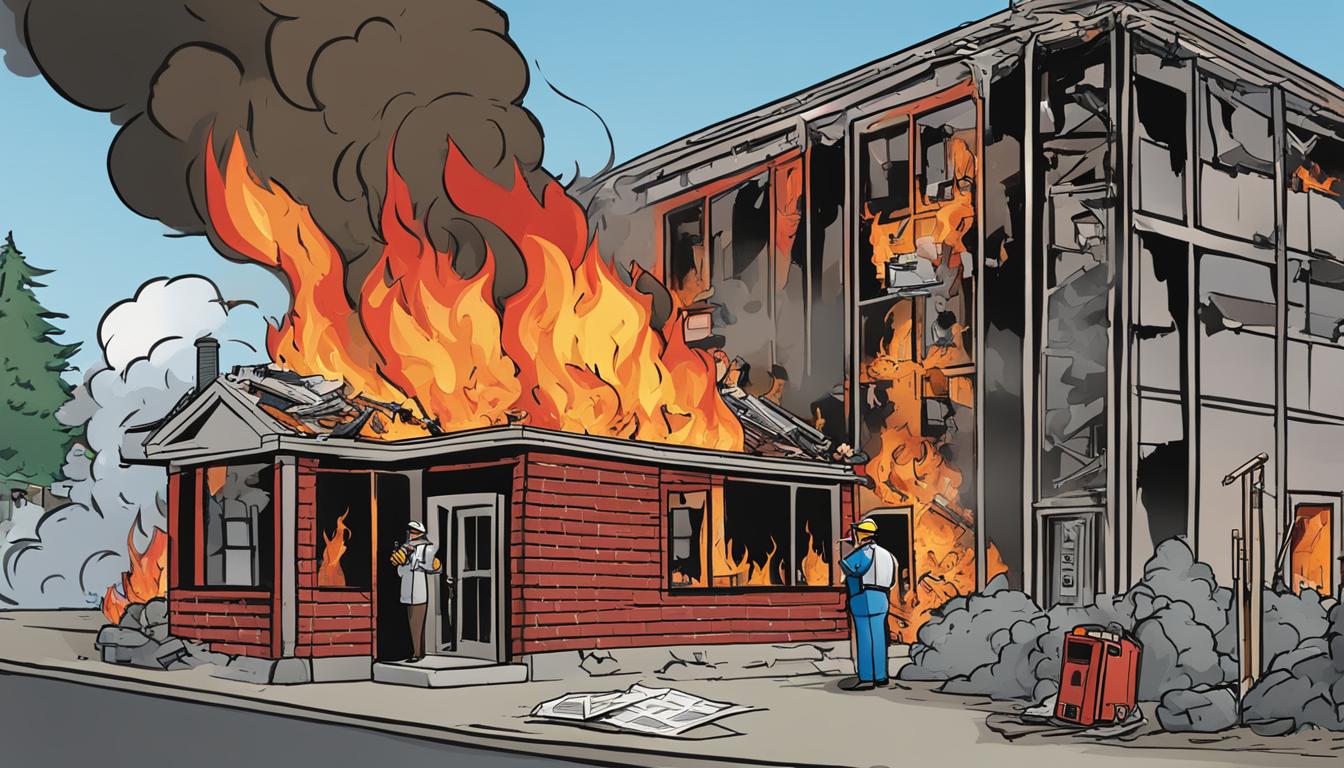When it comes to protecting your property from the devastating effects of fire, having the right insurance coverage is essential. Fire insurance policies offer different types of protection, tailored to meet various needs and scenarios. Understanding the types of fire insurance policies available can help you make an informed decision and ensure comprehensive coverage options.
Key Takeaways
- There are different types of fire insurance policies available to protect your property.
- Basic fire insurance policies provide coverage for fire-related damages to the insured property.
- Special fire insurance policies offer additional coverage beyond the basic policies, such as smoke and water damage.
- Named peril fire insurance policies cover damages caused by specific perils listed in the policy.
- All-risk fire insurance policies provide comprehensive coverage for all fire-related damages, unless specifically excluded.
Now that you have a basic understanding of the types of fire insurance policies available, you can make an informed decision about the coverage that suits your needs. Remember, protecting your property against fire damage is crucial for safeguarding your investment and ensuring peace of mind.
Basic Fire Insurance Policies
Basic fire insurance policies are the foundation of fire insurance coverage, providing essential protection against fire-related damages to your insured property. These policies offer peace of mind by covering the cost of repairing or rebuilding your property in the event of a fire, as well as the replacement of damaged belongings. With basic fire insurance, you can rest assured knowing that your property is safeguarded against the devastating effects of fire.
When you have a basic fire insurance policy, you can trust that your insurance provider will assist you in restoring your property to its pre-fire condition. Whether it’s repairing structural damage, replacing damaged flooring, or even remodeling your home, the coverage provided by basic fire insurance policies ensures that you won’t bear the financial burden alone.
Basic fire insurance policies serve as a safety net, offering financial protection and enabling a speedy recovery process in the aftermath of a fire.
Moreover, these policies cover not only the structural aspects of your property but also the contents within. From furniture and appliances to personal items like clothing and electronics, basic fire insurance policies include coverage for the replacement or repair of damaged belongings. This means that even if your belongings are destroyed or damaged beyond repair in a fire, you can rely on your insurance policy to assist you in replacing them.
It’s important to note that while basic fire insurance policies offer valuable coverage, they may not include protection against all risks. This is where special fire insurance policies come into play, offering additional coverage beyond the basics. The details of these policies can vary depending on the insurer, so it’s crucial to carefully review the terms and conditions to ensure that your property is adequately protected.
Comparison of Basic Fire Insurance Policies
| Features | Basic Fire Insurance Policies | Special Fire Insurance Policies |
|---|---|---|
| Coverage for fire-related damages | ✓ | ✓ |
| Cost of repairing or rebuilding property | ✓ | ✓ |
| Replacement of damaged belongings | ✓ | ✓ |
| Additional coverage for specific risks | X | ✓ |
Basic fire insurance policies provide essential coverage for fire-related damages, ensuring that you have the necessary financial support to recover from losses. While they may not offer the comprehensive coverage provided by special fire insurance policies, they are an essential starting point for protecting your property against fire damage.
Special Fire Insurance Policies
Special fire insurance policies offer additional coverage beyond the basic fire insurance policies. These policies are designed to provide more comprehensive protection for your property, safeguarding it against specific risks that may not be covered by standard fire insurance.
Some special fire insurance policies include coverage for:
- Smoke Damage: These policies cover damage caused by smoke resulting from a fire. This includes the cost of cleaning and restoring the property to its pre-fire condition.
- Water Damage: Firefighting efforts often involve extensive water usage, which can cause significant damage. Special fire insurance policies may cover the cost of repairing water damage caused by firefighting activities.
- Explosion Damage: In some cases, fires can trigger explosions that cause additional damages. Special fire insurance policies may offer coverage for these explosion-related damages.
By opting for special fire insurance policies, property owners can ensure that their assets are protected against a wider range of risks associated with fires. These policies provide peace of mind and financial security in the event of unexpected fire-related damages.
“Special fire insurance policies offer targeted coverage for specific risks, ensuring comprehensive protection for your property.”
It is important to assess the risks associated with your property and choose a special fire insurance policy that aligns with your coverage needs. Consulting with insurance professionals can provide valuable guidance in selecting the most suitable policy for your specific requirements.
Next, we will explore named peril fire insurance policies, which offer coverage for specific perils outlined in the policy.
| Key Features | Special Fire Insurance Policies | |
|---|---|---|
| Coverage | Additional coverage beyond basic fire insurance policies | |
| Benefits | Protection against damage caused by smoke | |
| Coverage for water damage from firefighting efforts | ||
| Protection for damages caused by explosions resulting from a fire | ||
| Comprehensive coverage for specific risks associated with fires | ||
Named Peril Fire Insurance Policies
When it comes to protecting your property against the devastating effects of fire, named peril fire insurance policies offer a targeted and comprehensive solution. These policies specifically cover damages caused by a list of identified perils, ensuring that you have coverage in place for the specific risks outlined in your policy. Commonly covered perils include fire, lightning, explosion, and other named risks.
Named peril fire insurance policies provide a more focused approach to fire insurance coverage. By listing the specific perils that are covered, these policies offer clarity and transparency regarding the risks you are protected against. This allows you to have a clear understanding of the extent of your coverage, empowering you to make informed decisions about your insurance needs.
One of the advantages of named peril fire insurance policies is that they can be tailored to suit your specific requirements. If your property is located in an area prone to certain types of perils, such as wildfires or earthquakes, you can customize your policy to include coverage for those specific risks. This flexibility allows you to have a policy that is aligned with the unique challenges and hazards faced by your property.
“Named peril fire insurance policies offer a more targeted approach to fire insurance coverage, protecting against specific risks identified in the policy.”
It’s important to note that named peril policies only provide coverage for the perils explicitly listed in the policy. Any damages or losses resulting from a peril not named in the policy would not be covered. Therefore, it’s vital to carefully review the list of covered perils and assess whether they align with the risks that are relevant to your property.

To help you better understand the concept of named peril fire insurance policies, here is a breakdown of common perils that may be included:
| Peril | Description |
|---|---|
| Fire | Covers damages caused by fire, including flames and smoke. |
| Lightning | Provides coverage for damages resulting from lightning strikes. |
| Explosion | Covers damages caused by explosions resulting from fire. |
| Earthquake | Offers protection against damages caused by seismic activity. |
| Windstorm | Provides coverage for damages caused by high winds and storms. |
By understanding the specific perils covered under a named peril fire insurance policy, you can make an informed decision about the level of protection you need for your property. Evaluating the risks and hazards your property may face is crucial for selecting the appropriate coverage.
Summary
Named peril fire insurance policies offer targeted coverage for damages caused by specific perils listed in the policy. These policies provide transparency and clarity regarding the risks covered, allowing you to customize your coverage to suit your property’s unique needs. However, it’s important to review the list of covered perils carefully to ensure they align with the specific risks relevant to your property.
All-Risk Fire Insurance Policies
All-risk fire insurance policies, also known as comprehensive fire insurance policies, offer property owners the highest level of coverage against fire-related damages. With these policies, property owners can enjoy broad protection that extends to all types of fire incidents, unless specifically excluded in the policy.
All-risk policies are highly sought after by property owners seeking extensive coverage for their valuable assets. By opting for an all-risk fire insurance policy, property owners can have peace of mind knowing that their property is well-protected from any unforeseen fire-related event.
Unlike other types of fire insurance policies that provide coverage only for specific perils or named risks, all-risk policies provide a comprehensive safety net for your property. This means that any fire-related damage, unless stated as an exclusion in your policy, will be covered under an all-risk fire insurance policy.
This type of policy is especially beneficial for property owners who want to ensure they have protection against a wide range of fire-related hazards. It eliminates the need to worry about specific risks and allows property owners to focus on safeguarding their valuable assets.
Whether it’s damage caused by fire, smoke, explosions, or other fire-related incidents, an all-risk fire insurance policy provides the necessary coverage to restore your property to its original condition.
Benefits of All-Risk Fire Insurance Policies
Choosing an all-risk fire insurance policy offers several benefits:
- Comprehensive Coverage: With an all-risk policy, you can enjoy coverage for a wide range of fire-related damages unless specifically excluded.
- Peace of Mind: Knowing that your property is protected against various fire-related risks can provide peace of mind and security.
- Flexibility: All-risk policies are flexible and can be tailored to meet the specific needs and requirements of property owners.
- Quick Claims Processing: In the event of a fire-related incident, all-risk policies generally allow for quick and efficient claims processing.
- Reduced Financial Burden: With an all-risk policy, property owners can mitigate the financial burden of repairing or replacing damaged property.
Exclusions in All-Risk Fire Insurance Policies
While all-risk fire insurance policies offer comprehensive coverage, it’s important to note that there may be certain exclusions. These exclusions typically vary depending on the insurance provider and policy terms. Common exclusions in all-risk policies may include:
- Intentional acts of fire damage
- Acts of war or terrorism
- Damage caused by nuclear accidents
- Damage caused by natural disasters such as earthquakes or floods (might require additional coverage)
It’s crucial to carefully review your all-risk fire insurance policy to understand the specific coverage and any exclusions that may apply.
| Benefits of All-Risk Fire Insurance Policies | Exclusions in All-Risk Fire Insurance Policies |
|---|---|
| Comprehensive Coverage | |
| Peace of Mind | |
| Flexibility | |
| Quick Claims Processing | |
| Reduced Financial Burden | Intentional acts of fire damage |
| Acts of war or terrorism | |
| Damage caused by nuclear accidents | |
| Damage caused by natural disasters such as earthquakes or floods (might require additional coverage) |
Replacement Cost Fire Insurance Policies
When it comes to safeguarding your property against fire damage, replacement cost fire insurance policies offer comprehensive coverage that goes beyond standard policies. These types of policies provide coverage for the full cost of repairing or replacing damaged property without considering depreciation.
Unlike actual cash value policies that take into account the depreciation of property over time, replacement cost fire insurance policies ensure that the insured property can be restored to its original condition without imposing a significant financial burden on the policyholder. This means that you can have peace of mind knowing that your property will be fully repaired or replaced without having to make up the difference between the depreciated value and the actual replacement cost.
With replacement cost fire insurance policies, you have the assurance that your property will be restored to its pre-fire condition, allowing you to rebuild without the worry of financial strain. Whether you own a residential property or a commercial building, having this type of coverage can provide you with the necessary resources to recover from a fire incident and get back on track.
Conclusion
Understanding the different types of fire insurance policies is crucial for protecting your property from the devastating effects of fire damage. Whether you choose a basic policy, a special policy, a named peril policy, or an all-risk policy, it’s important to select a policy that provides comprehensive coverage tailored to your specific needs.
By carefully evaluating your fire insurance options, you can ensure that your property is well-protected against various fire-related risks. Basic fire insurance policies offer fundamental coverage for property and belongings damaged by fire, serving as the foundation for fire insurance coverage.
For enhanced protection, special fire insurance policies provide coverage for additional risks such as smoke damage, water damage from firefighting efforts, or damages caused by fire-related explosions. Named peril policies offer targeted coverage for specific perils listed in the policy, while all-risk policies provide broad protection unless specifically excluded. Replacement cost policies ensure that damaged property can be repaired or replaced without considering depreciation.
With the knowledge of these fire insurance policy variations, you can make an informed decision about the type of policy that best suits your needs. Protecting your property with the right fire insurance policy gives you peace of mind, knowing that you have comprehensive coverage against fire-related damages.


